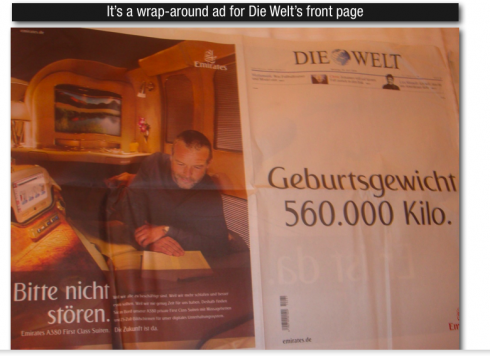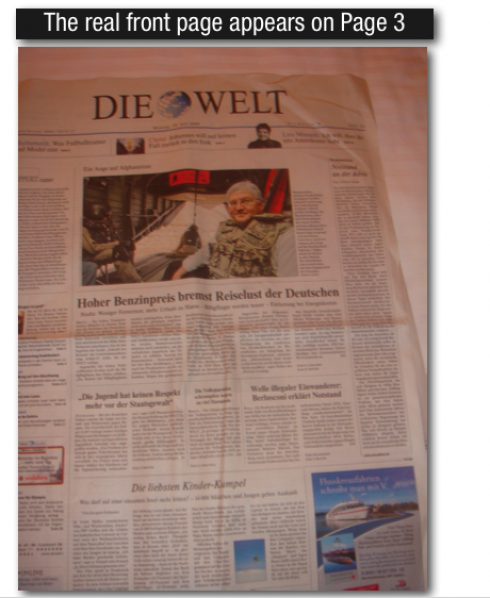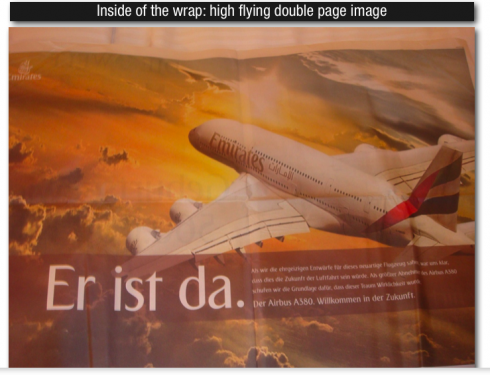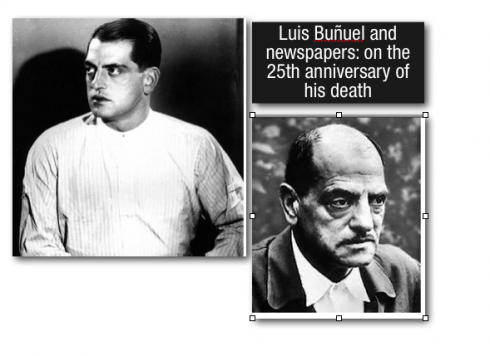


Die Welt, one of Germany’s largest daily circulation newspapers, wrapped an Emirates Airlines ad around itself Monday, July 28. Here it is: a simple, direct and powerful two-page ad, front and back, with the newspaper’s logo at the top, and then a traditional page one that was actually page three.
Ironically, here is another example of how print can differentiate itself from online editions. It would be impossible to duplicate the impact of a wrap-around advertising online. Just can’t be done. Of course, Emirates could buy space online and animate the ad—-showing one of its jets flying through the screen to promote its new routes to New York or Sao Paulo. Somehow, however, if what Emirates’ advertisers want is the maximum benefit from a print ad, then the one in Die Welt is the answer.
One sees these ads appearing more often, and I predict that they will become standard procedure for newspapers around the world, although we are not likely to see them much in the United States, where this type of advertising placement sends editors into long philosophical discussions of the role of the newspaper and the meaning of serious journalism.
It is my hope that American editors, pressed by the harsh reality of an economy that does not seem to get over its bad cold, will take another look and realize that there is nothing wrong with what Die Welt is doing, and the presence of a wrap around ad does not in any way compromise journalistic ethics or standards of professionalism.
IN CASE YOU MISSED IT:
https://www.garciamedia.com/blog/articles/its_a_wrap_or_a_belt_the_new_ad_configurations1/
WE SEND YOU:
www.welt.de

A NEWS JUNKIE, BUNUEL’S DEATH LAMENT WAS HOW MUCH HE WOULD MISS THE NEWSPAPERS:
The Spanish cinematographer Luis Buñuel died in Mexico 25 years ago today. Always controversial, but regarded as a genius behind the camera, and unequaled in his surrealistic approach (he was a friend of Salvador Dali), Buñuel would probably like to rise from his grave today and take a look at what is happening in the world.
This is what Buñuel wrote in his memoir, My Last Breath (Mi Ultimo Suspiro) about his curiosity for what would happen in the world after his death:
“If there is one thing I will hate upon abandoning this world while it is still moving is not to know what will happen next, as if in the middle of a soap opera. I don’t think that this interest for what will happen next was part of what our ancestors thought about, or perhaps it existed less, in a world that hardly changed. So, I confess: in spite of the fact that I hate the media, I would like to be able to rise from among the dead every 10 years, get to a kiosk and buy several newspapers. I would not ask for anything else. With my newspapers under my arm, pale faced, touching the walls as I walked, I would return to the cemetery and would read all about the world’s disasters, before returning to sleep, satisfied in the tranquilizing refuge of my grave.”
Today, Buñuel would not even have to walk to the corner kiosk to get his newspapers. He would simply go online to get his information.
He certainly would have enjoyed reading the tributes to him published in the Sunday editions of the two leading Spanish newspapers, El Pais (Madrid) and La Vanguardia (Barcelona) .
WE SEND YOU:
www.elpais.com
www.lavanguardia.es
WHERE IS MARIO? In Hyderabad, India, watching the constant rain fall, but still admiring the new Hyderabad Airport, which opened last March, is definitely one of India’s most modern airports, a welcome change from the crowded, deteriorated air terminals that abound in this country of contrasts.